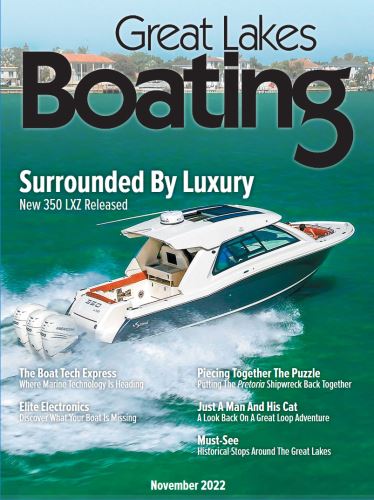
Photos courtesy of Yanmar/Neander-Motor
On the heels of Yanmar’s Monaco Yacht Show announcement about its new 50 horsepower diesel outboard, Yanmar’s North, Central and South America’s area manager Kevin Carlan speaks exclusively with Great Lakes Boating editors.
“Obviously, outboards are getting more and more popular for marine applications requiring great than 500 horsepower,” says Carlan. “This first offering is best suited for a work-boat application in providing more torque, longer lifespan, much better fuel economy when compared to gas outboards.”
From wind turbine servicing and fish farming to harbor and patrol duties to water taxis and superyacht charter services, the applications for this long-awaited diesel outboard seem limitless.
Yanmar Dtorque 111 has a unique design with two counter-rotating crankshafts, which eliminates vibration and allows for higher torque output. A lack of vibration in the two-counter-rotating crankshaft design means it no longer needs the heavier vibration-absorbing clout of a traditional diesel. It runs smoother, has double the engine life at an expected lifespan of over 10,000 hours and puts out fewer toxic emissions. At full throttle and full loading, it typically burns less than 3.2 gallons of fuel per hour — which is half the amount of gasoline in similar-performing outboards. The Dtorque 111, incidentally named for its remarkably low RPM torque with 111 Nm on offer at 2,500 rpm, can bring a boat up to plane even faster.
The Dtorque 111 was tested near Luleå, Sweden, at temperatures of -15 degrees Celsius. In a port area freed from ice for the tests, the engine ran perfectly in all speed and load ranges and started and idled so reliably at these icy temperatures the Swedish coast guard expressed immediate interest.
“We’re looking to make it available for sale across Canada by March or April of 2018. Right now, we’re excited about its possibilities and looking for companies to test units before the end of 2017.” Due to anticipated demand, Austria’s Stevr Motors will be tooling up for mass production at the first of the year. 50 units are available locally, which Carlan hopes to place in test-case scenarios close to home. Yanmar knows this is the absolute cutting edge of outboards and wants to ensure it gets off on the right foot.
“With many commercial operators maintaining a single diesel fuel policy to avoid risk of fire and explosion,” adds Yanmar Global sales manager Floris Lettinga, “the market potential for the Dtorque 111 is highly diverse. So far, the main option for small workboat propulsion has been the gasoline outboard. No longer is that true!”

